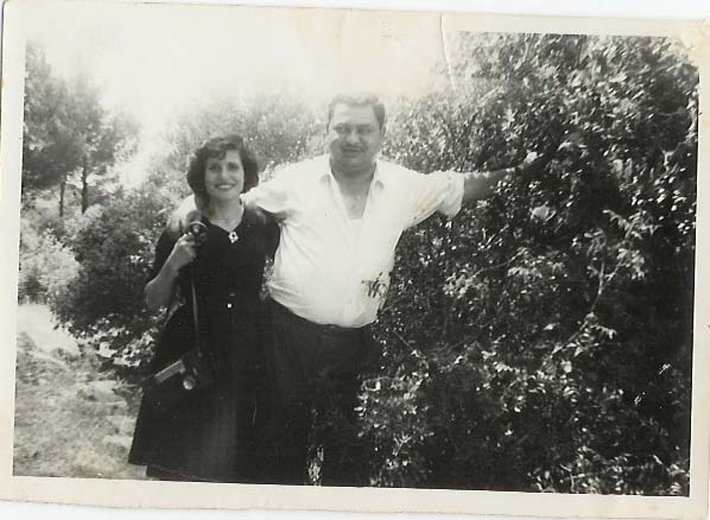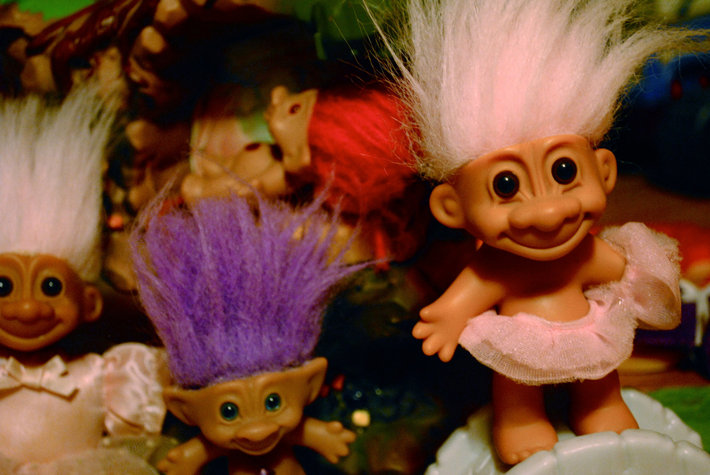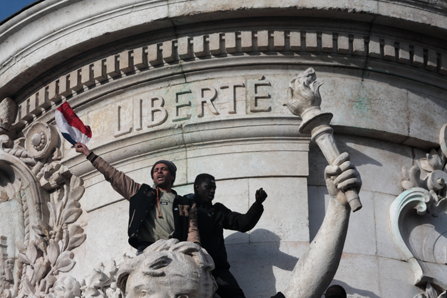Have the Trolls Really Won the Internet?
A Story of Good vs. Evil
My father used to tell people we were Greek. Nothing wrong with being Greek, other than the fact that we were Palestinian.
It was his way of defending the family against attacks. I found this out rather awkwardly one summer while working at the family grocery store, Hilltop Market, in San Francisco’s famed Haight-Ashbury district. One of our regular customers, a blind man named Tom, asked me where I was born. “Jerusalem,” I responded cheerily. “I thought your father said you were Greek,” he inquired quizzically. I stammered, “Um, yeah, we’re… we’re um, half-Greek.”
Tom might have been blind but he could see straight through me.

So, to the neighborhood, we were the nice “Greek” family that ran the corner market. Meanwhile, the only images of Arabs our customers were left with were those dutifully supplied by the mainstream media and Hollywood—notably villains and terrorists.

Back then, I was president of the local chapter of the American-Arab Anti-Discrimination Committee (ADC), a group modeled after the Anti-Defamation League (ADL) and founded by former Arab-American Senator James Abrourezk. I discovered, back then, that this disease of invisibility was endemic to the Arab-American community. With a handful of notable exceptions like radio personality Casey Kasem, most Arab-American citizens and celebrities were busy being “Greek,” or “Armenian” or anything but Arab. Whether justified or not, they feared that being identified as Arab opened them up to prejudice or even blacklists. So, as a community, we were largely invisible.
I understood it. No one likes to be spit on and called a terrorist, which happened to me in the streets of Berkeley in 1984. Or be told over and over again to “go back to where you came from.” Or have a girl refuse a ride with you and your friends after a high school dance because she was “afraid of Arabs.” Don’t get me wrong, I’m not “a victim” of anything. I’m just pointing out that campaigns that malign a group affect the public’s perceptions of that group. So the answer for many Arab-Americans was to assimilate or vanish as an ethnic group.
Is the internet representative? Is there really that much negativity and deception in the world? And does it so outweigh the good?
Yes, there’s a certain comfort in digging a hole in the ground and shoving your head into it. The ground below is cool, and you don’t have to witness all the ugliness in the world. But it’s a mistake. A massive one. With nothing to stop it, the weed of negativity grows around and above you unabated until it buries you alive. The only answer to bigotry is to stand up and be heard, be visible.
Back in the days of ADC, the battleground for the hearts and minds of the public were Hollywood and the news media. Today, much of this has transferred to the internet where a phenomenon called “trolling” has taken center stage. On the net, individuals and groups are attacked by ravenous piranhas from various quarters. And I’m not talking about just Arab issues, I’m taking about any and all forms of lies and deception about many subjects used to influence minds.

Former Reddit CEO Ellen Pao once stated that the trolls are winning the internet. There are over three billion people with access to the internet—practically half the planet—and Ellen Pao believes the battle is over. That’s quite extraordinary, if true.
Is the internet representative? Is there really that much negativity and deception in the world? And does it so outweigh the good? I don’t think so.
First of all, who exactly are these trolls? Some would have you believe they’re just a spontaneous combustion of opinions from various parts of the world. But is that entirely true?
Several corporations have been caught hiring trolls to defame their competition. Samsung got fined after being caught spreading lies about one of its competitors. Monsanto was caught hiring trolls to smear activists that exposed their misdeeds. Politicians hire operatives to smear their opponents with half-truths and outright fabrications. And these are just a few examples of those who have been caught. There are countless others who continue their trolling with impunity.
“Paid forces devise clever, covert ways to shape the total information landscape in ways you can’t imagine. Their goal is to fool you. Public ideas are meticulously orchestrated to appear random.”
Trolling has become so prevalent that it’s now a career path for the so-inclined. You can go to work for a public relations agency as a troll, albeit in a room probably hidden away on a secret floor. Sure, some trolls are just independent purveyors of negativity, but more often than not, they are actually hired guns serving hidden agendas.

In her book, “The Smear: How Shady Political Operatives and Fake News Control What You See, What You Think, and How You Vote,” Sheryl Attkisson states: “Paid forces devise clever, covert ways to shape the total information landscape in ways you can’t imagine. Their goal is to fool you. Public ideas are meticulously orchestrated to appear random. Op-eds printed in major news publications are ghostwritten by paid agents in the name of shills who rent the use of their signature.”
She’s spot on. A handful of people covertly create an illusion of “millions.” Their aim is to create a snowball of negativity that takes on a life of its own, destroying the individuals or groups in its path.
And make no mistake, the trolls have influence. We’ve all witnessed much of this in play in the current political landscape. To the public, it appears that some salacious story must be true because it’s all over the news media and internet when it’s only a few trolls creating the chaos and the men in the shadows that hired them in the first place.
Trolling has become the modern form of propaganda, whose root word means “to propagate.” That’s what trolls do: they “propagate” lies and distortions in order to influence minds. They have an agenda and they’re ingeniously devious.
And if you believe Ellen Pao, they have won.
What the people that hire the “trolls” know, is that ideas are powerful. An idea can stop a war… or start one. I remember, during the lead-up to the first Iraq war, the sudden appearance of countless books comparing Saddam Hussein to Hitler. As one familiar with the Middle East, I wondered where those books came from all of a sudden. I’m not defending Saddam Hussein by any means, but it was clear to me there was an agenda at hand: swaying the public to support a war. And sway they did. Friends of mine that couldn’t tell you the difference between Iran and Iraq were whipped into a frenzy to annihilate Saddam Hussein. All of a sudden they reviled the man, when he’d been killing his enemies for decades without a peep. But now, he was “Hitler.” It worked. We went to war. Trillions were spent. Hundreds of thousands of lives were lost. And for what? The Middle East is a bigger mess than ever.
Today, this type of frenzy is whipped up online on Facebook, Twitter and various forums.
So what’s the answer to all this negativity? Do we all become “Greek” and just disappear? Do we let the evil run amok and pray that others will see through the lies? Or must we be visible and speak up, regardless of whether or not we get attacked for it?

To me, there is no other answer than to stand up and speak one’s mind. Doing anything else is suicide.
The biggest fear a troll has is to be exposed. There are over three billion people on the internet and the vast majority are good, honest people. And good people have lives, they work, they have families to tend to and they disdain negativity—even against those that spew it. And because they have lives, they don’t have much time to spend trolling trolls.
Edmund Burke once said: “The only thing necessary for the triumph of evil is for good men to do nothing.”
But they can’t afford not to speak up.

The right to free speech is fundamental. Let’s not let the trolls usurp it. It would be nice if we could all plant our heads underground, until the evil goes away on its own. But life doesn’t work that way. One day, we’d stand up, shake the dirt out of our ears, look around and find out that the world no longer exists. And why? Because we didn’t do anything about it.
Edmund Burke once said: “The only thing necessary for the triumph of evil is for good men to do nothing.”
Yes, there are over three billion people on the internet. A handful are trolls trying to make the world seem dark and sinister. But the good outnumber them by a huge proportion.
So, let’s work together to put some beauty in the world and shine the light of truth on the trolls. Let’s make this world a place where good people can live their lives and evil has no shot at triumph.











